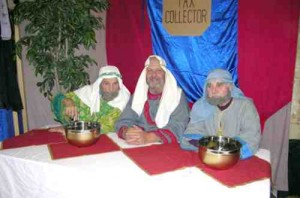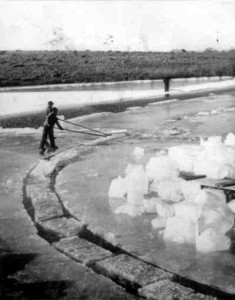Column by Hal Walter
Economy – December 2008 – Colorado Central Magazine
IN POLITICALLY UNILATERAL Custer County, Sen. John McCain beat Barack Obama 1,668 to 914. That makes us sort of like Georgia with better scenery and fewer Confederate flags.
I’m actually a registered Republican but voted for only one of the party’s candidates this year. I changed my political affiliation a few years ago when I realized there was no other way to have any voice in local politics. Before that, I had been a Democrat, a Libertarian, and I believe was registered as independent for a while.
Changing to Republican has its advantages. Just ask Jim Austin, who ran as a Democrat for sheriff and county commissioner in recent years and lost. He switched to the GOP and won a commissioner seat this year by a large margin over Green Party candidate Jerry Lacy. No Democrat even bothered to run.
In fact, the only Democrat on the ballot to win the Custer County vote was John Salazar, a very popular incumbent U.S. Representative who also is a potato farmer from just across the range in the San Luis Valley. Salazar won by just 161 votes in this county, and the 1205 votes for Republican challenger Wayne Wolf might give some statistical indication of how many GOP voters voted a straight-party ticket.
As a Republican you receive some interesting mail and phone calls. Change can only come from within in the Republican Party, and so I was glad to be able to put the alarmist fear tactic flyers and even DVDs in their proper place, the trash. I learned to promptly hang up when the inevitable “robocalls” came pouring in.
As a Republican member of the mainstream media (see hardscrabbltimes), I was late in making my presidential endorsement, but decided to publicly back Barack Obama in the waning days of the campaign, after I had already voted early for him myself.
The central issue of this election was — and still is — the economy. Just recently we’ve received news of lost jobs from the top of the Arkansas River Valley at Climax Molybdenum all the way to Pueblo where Trane and Evraz Rocky Mountain Steel Mills (formerly CF&I) will be idling workers.
During the campaign Obama’s opponents chided him about “redistributing the wealth.” This is something these plutocrats disguised as Republicans actually know something about. For the last eight years we’ve seen the wealth of the middle class directly or indirectly redistributed to oil companies, war-profiteers, the disease-care (some call it health-care) industry, insurance companies, Wall Street fat cats and just about every other corporate concern. And now we are seeing the effects.
Personally, for the last eight years I have had to work harder for relatively less money than at any other time in my adult life. At one point during this dismal economic period I actually made a fair amount of money by my standards working day and night the equivalent of three part-time jobs as a writer, editor and ranch manager. But all that hard-earned income disappeared in a wave of higher costs of living, medical and special needs expenses for my son, increasing debt and, yes, higher taxes.
The definition of insanity is doing the same thing over and over again and expecting a different result. This country is desperately in need of a new direction when it comes to the economy. Hopefully President-elect Obama will also provide the best hope for re-establishing our credibility in the foreign policy arena, and the best plans for addressing energy independence, education, health care and every other major issue facing this country.
FOR ABOUT 35 minutes on the Saturday before the election, I was 6 feet 2 inches tall. Or maybe 6’1″. That’s because I was standing on my toes among 16,000 cheering people trying to get a glimpse of Obama.
I had never seen a presidential candidate or president. So Obama’s second visit to nearby Pueblo was difficult to pass up. On his first visit he spoke at the Colorado State Fairgrounds and I was the night city editor at The Pueblo Chieftain that evening so I didn’t get to go.
This time around, Obama was set to speak in the Union Avenue Historic District. After much waffling, I jumped in the car, drove 50 miles, and met my Westcliffe friend Mick and his buddy Warren at the security entrance about a block from the stage. We moseyed through the crowd to get as close as we could. It seemed like we would have a decent view from less than a block away.
I was unprepared for what happened when Michelle Obama took the stage for her introductory speech. Suddenly everyone was standing on their toes. A great number of people were holding digital cameras or signs up over their heads, and many were hoisting children high to see.
I shifted from side to side and stood on my toes to get a glimpse. And then Barack took the stage. Though he was easy to hear via the loudspeakers, I could not find him on the stage through the arms, cameras and piggy-backed kids.
While struggling to get a glimpse, I was struck by his words. The guy was serious and humorous at the same time. He addressed very complicated topics using the speech of an ordinary person. And there was a genuine quality about everything he said.
I can stand on my toes for a long time. One by one the people grew tired, and suddenly there he was. It was not an up-close view, but it was Barack Obama, in person. I was standing tall and while listening to what he had to say I had the feeling I had caught a glimpse of both a presidential candidate and a president.
Three days later, on my way to work on Election Night coverage for The Chieftain, I stopped at the Hopscotch Bakery for coffee and snacks and, superstitiously hoping it would bring good luck, drove through the intersection of Union Avenue and D Street, where Barack Obama had spoken.
THERE’S ALWAYS A BUZZ around a newsroom on Election Night, but this one seemed different for so many reasons. The televisions were tuned to various cable news networks and editors were scanning Internet news outlets trying to get the latest word on what was happening. This is newspaper work in the electronic age.
The dictionary defines anachronism as a chronological discrepancy. And so it seemed strange, when a major news network called the presidential race for Obama, to see everyone in the newspaper’s staff gather around the TV to see history being made — and what we would be putting into print for people to read the next morning. As newspapers have done through the decades, we would be recording history in print, and believe me it is hard work. The irony is most readers already would know most of the election outcomes before our press would even run.
Still, there’s something exciting about having even a tiny role in recording such a momentous event. Later that evening, as I held a final proof of page 1A in my hands with the huge headline that screamed “OBAMA WINS” I had the powerful feeling of being precisely at a moment in time when everything was standing still — marking the ending and the beginning of so many things.
And then I did what I always do when we put the newspaper to bed. I got in my truck and drove back home to Custer County, where some of my fellow Republicans need to embrace change.
Hal Walter writes from Ilse, a ghost town which probably voted for Bryan in 1896.


